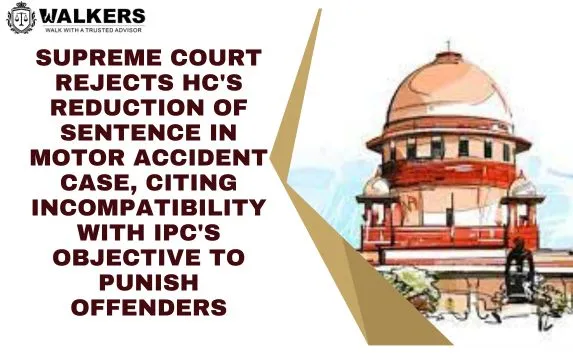


On March 28, the Supreme Court of India overturned a decision made by the Punjab and Haryana High Court to reduce the sentence of a man convicted in a motor accident case involving rash driving and causing death due to negligence. The apex court stated that the primary objective of the Indian Penal Code is to punish offenders for their crimes, and therefore, the act of showing "undue sympathy" by the high court was unsustainable and warranted interference with its order. The Supreme Court emphasized the punitive and deterrent nature of the IPC and underlined that its principal aim is to punish offenders for committing offenses.
During an appeal made by the Punjab government against the decision of the high court to reduce the sentence of a man convicted in a motor accident case, a division bench of Justices MR Shah and CT Ravikumar emphasized the need to strictly punish offenders responsible for causing such accidents. The bench highlighted the increasing burden of road traffic injuries and fatalities in India due to rapidly increasing motorisation. The emotional, social, and financial trauma caused by the loss of a family member or the incapacitation of the victim cannot be measured. The court stressed the principle of proportionality between the crime and punishment, which forms the basis of sentencing for criminal offenses. The bench underlined that just punishment is crucial in such cases.
The present appeal pertains to a motor accident case caused by the accused's reckless and negligent driving, which resulted in the death of one person and injuries to two others inside an ambulance that overturned due to the collision. The accused was found guilty under Sections 279 and 304A of the Indian Penal Code. While the high court upheld his conviction, it deemed it necessary to reduce his sentence due to the accused's financial condition, as he was a driver by profession.
In contrast to the high court's decision, the Supreme Court took a firm stance on the matter, stating that the gravity of the offense and the accused's actions were not appropriately considered. The apex court underlined that due to the accused's reckless and negligent driving, one person lost their life, and two others in the ambulance were injured. Moreover, the court emphasized that the high court failed to consider the impact on the ambulance, which had turned turtle, highlighting the accused's negligent driving. Therefore, the bench held that there was no valid reason for the high court to interfere with the trial court's cogently reasoned sentence. The Supreme Court also noted that the accused's claim of coming from a poor family cannot be considered a mitigating circumstance, as his actions resulted in the death of an innocent person and caused injuries to two others.
The bench, headed by Justice Shah, referred to two significant judgments, namely State of Madhya Pradesh v. Surendra Singh [(2015) 1 SCC 222] and State of Punjab v. Saurabh Bakshi [(2015) 5 SCC 182], while citing relevant legal precedents. The Supreme Court held in the former case that undue sympathy leading to the imposition of an inadequate sentence would harm the justice system by eroding public confidence in the law's efficacy. In the latter case, the court recognized the corrective nature of sentencing but also stressed the necessity of deterrence on certain occasions. The bench relied on the principles laid down in these cases to allow the appeal by the state of Punjab. It held that the high court's display of 'undue sympathy' was unsustainable and quashed and set aside the impugned order.
SUMMARY: The Supreme Court has held that the object of the Indian Penal Code is to punish offenders for their crimes and it is both punitive and deterrent. While corrective measures should be recognized in sentencing, deterrence becomes necessary under certain circumstances. Expressing undue sympathy by imposing an inadequate sentence harms the justice system and erodes public confidence in the law's efficacy. The court has held that the high court's expression of undue sympathy in reducing the sentence of a motor accident convict was unsustainable, and the original sentence imposed by the lower courts should be restored. Therefore, the court allowed the appeal.
Case Title
State of Punjab v. Dil Bahadur | Criminal Appeal No. 844 of 2023.
Click Here to: Download/View Related File
TAGS: Motor Accident Case Indian Penal Code Sections 279 304A reduction of sentence punitive deterrent corrective measures undue sympathy inadequate sentence erosion of public confidence efficacy of law appeal allowed.